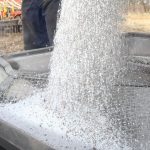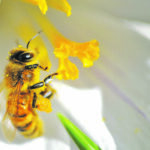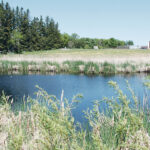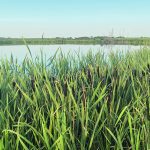Environmental groups, scientists say Bayer influenced the federal agency and its reversal on the safety of imidacloprid
WINNIPEG — Environmental groups and scientists are accusing the Pest Management Regulatory Agency of ignoring data and working too closely with the crop protection industry. The claims are detailed in a Nov. 22 letter to federal health minister Mark Holland from the David Suzuki Foundation, the Canadian Wildlife Federation and others. The letter focuses on […] Read moreTag Archives neonicotinoids

Study scrutinizes neonics’ flea beetle mastery
Striped species has always had a natural ability to tolerate neonics, but the insecticide remains effective against crucifers
WINNIPEG — Many generations of flea beetles have been exposed to neonicotinoids in Western Canada over the last two decades. Farmers across the Prairies plant 20 million acres of canola and most of the seeds, year after year, have been coated with neonicotinoid insecticides, commonly known as neonics. From 2017 to 2022, there were many […] Read more
Brazil restricts insecticide use
SAO PAULO, Brazil (Reuters) — A decision by Brazilian environmental agency Ibama to restrict the use of the widely popular thiamethoxam insecticide has attracted criticism from farmers and makers of the product, which is seen as toxic for bees and other pollinators. After a public consultation, Ibama decided thiamethoxam may no longer be sprayed by […] Read more

BLOG: An Ontario problem, a prairie concern
In the spring of 2018, Health Canada proposed a ban on all agricultural uses of two insecticides, thiamethoxam and clothianidin. Health Canada scientists said the insecticides, known as neonics, were accumulating in ponds, creeks and other water bodies near agricultural land. The concentrations were harmful to midges and mayflies and therefore posed a threat to […] Read more

Bat poop research gets to the bottom of pesticide residue
Alberta researchers look for information about how insecticides may be affecting bats by poking into what remains from their diets
The Alberta Community Bat Program is looking for bat homes near crops to test the bat poop for insects and lingering pesticide found in the guano. “The insecticide project ties in well with our bat-friendly farms initiative, which aims to promote bat stewardship on farms and improve practices for how bats are managed in these […] Read more
Health Canada reverses ban on neonics
In November 2016, Health Canada said it would ban agricultural uses of imidacloprid, an insecticide widely used on Canadian farms. About 4 1/2 years later, department scientists have changed their minds. Imidacloprid will not be banned. On May 19, Health Canada’s Pest Management Regulatory Agency (PMRA) released its re-evaluation decision for imidacloprid, a Bayer insecticide. […] Read more

Science has prevailed in PMRA’s neonic ruling
The recent neonics nod has left farmers pleasantly surprised and environmental groups deeply disappointed. The agricultural industry waited with some trepidation this spring for a ruling by Health Canada on use of neonicotinoid insecticides, which are used to control various production-limiting crop pests. Three years ago the Pest Management Regulatory Agency made a preliminary decision […] Read more

Farmers applaud neonic ban reversal
Health Canada’s Pest Management Regulatory Agency said March 31 that it’s possible for farmers to use neonicotinoid insecticides on most crops, with some reduction in rates and frequency of use. “Health Canada’s scientists have reviewed a large body of scientific information and concluded that a complete ban on neonicotinoid pesticides is not warranted,” it said. […] Read more

Health Canada changes course on neonics
The final decision has been delayed several times, but today Health Canada’s Pest Management Regulatory Agency announced that neonicotinoid insecticides are not a threat to aquatic insects when used as a seed treatment on canola and in many other instances. “While we are still reviewing the full details of the special review decisions, we are […] Read more

Water data will determine neonic decision: PMRA
Health Canada will rely upon water monitoring data, not computer models, when it makes its final decision on the environmental safety of neonics. Frederic Bissonnette, a Health Canada spokesperson, said scientists with the Pest Management Regulatory Agency have a huge amount of data on the concentrations of neonicotinoid insecticides in wetlands, creeks and water bodies […] Read more




